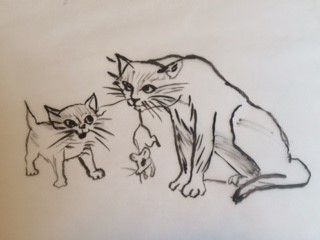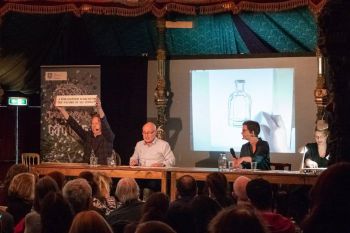Sussex lecturer helps bring adaptation of first English novel, about talking cats and religion, to Brighton Fringe
By: Stephanie Allen
Last updated: Wednesday, 8 May 2019

© Penny McCarthy

A stage adaptation of the world’s first ever English novel, co-created by a University of Sussex lecturer, will be heading to campus as part of the Brighton Fringe next month.
Beware the Cat is a little known satire of magic and religious controversy written by William Baldwin in 1553, during a time of political and social change.
Baldwin’s work had a big influence on some of Tudor England’s major writers, including Shakespeare. His novel of witchcraft, religious controversy and talking cats is an attempt to help us imagine what animals might say about the world if they had the ability to talk.
Dr Rachel Stenner, Lecturer in English Literature 1350-1660, helped adapt Beware the Cat for performance with Professor Frances Babbage at the University of Sheffield, alongside Terry O'Connor, a member of the renowned performance ensemble Forced Entertainment and artist Penny McCarthy.
The adaptation was first performed in September 2018 at the University of Sheffield’s Festival of the Mind. Now it will appear at Attenborough Centre for the Creative Arts as part of the Brighton Fringe on Friday 10 May before touring to other cities in the UK including the Royal Shakespeare Company's creative hub, The Other Place, in Stratford-upon-Avon (6 July) and the Workshop Theatre in Leeds (23 November).
Dr Stenner said: “The performance features original artworks, a unique soundtrack, and four actors providing a multivoiced reading of Baldwin’s writings, adapted to convey the liveliness of this quirky tale to a modern audience.”
Beware the Cat tells the story of a talkative priest who is determined to understand the language of cats after being kept awake by a feline rabble on the rooftops.
Conducting grisly alchemical experiments, the priest consumes a potion and discovers that the cats can not only speak, but have a social hierarchy, a judicial system and carefully regulated laws governing sexual relations.
Despite penning the novel in 1553, Baldwin, based in the bustling print shops of 16th-century London, decided not to publish his work until a decade later.
England was going through a period of intense religious reformation at the time. While Beware the Cat was written during the reign of the protestant King Edward VI, his sudden and early death saw Mary I take the throne; a strict Catholic.
Baldwin rightly understood that publishing a book that parodies the mass and depicts Priests in some very undignified positions, may not be the best decision at such a tumultuous time.
Dr Stenner said: “Beware the Cat’s censorship by its own author shows that it was a highly controversial story for its time.
“Aside from its pointed religious satire, the novel is very funny. It also makes a crucial contribution to early modern thought on our relationship with animals and the natural world.
“Sadly, the text is nowhere near as widely known as the work of other early modern writers, despite the fact that Baldwin’s writings inspired some of the big names in literature from the age, including Shakespeare.”
To book tickets for Beware the Cat at ACCA on 10 May, visit: https://www.attenboroughcentre.com/events/3054/beware-the-cat
